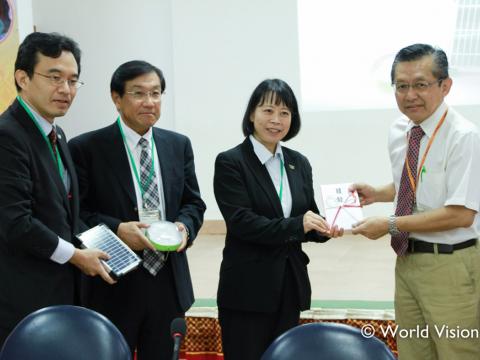No Electricity? Not a Problem!

Panasonic Corporation donated 996 solar lanterns to 498 World Vision children and youth clubs in 21 districts around 8 different provinces in Cambodia. The handover ceremony was held in World Vision’s Phnom Penh office.
Ms. Rika Fukuda, General Manager of Panasonic Corporation, said, “Our donation is to contribute to the Millennium Development Goal which is achieve universal primary education.”
Mr. Joo Chong Lim, speaking on behalf of World Vision, added, “The distribution of solar lanterns will improve the quality of education of school children up to Grade 6 or higher and this will also promote self-learning at home. More than 12,000 children and youth will benefit from the light of these lanterns.”
See more photos from this event
This is the second time that Panasonic Corporation has donated solar lanterns to Cambodia through World Vision. In 2012, 209 solar LED lanterns were distributed to 209 health centres across 8 provinces to literally shine a light on the work of midwives during the nighttime. The light from the solar lanterns benefited more than 23,000 pregnant women per year who delivered their babies at night.
This time, the solar lanterns will be used to support peer learning in the evening in places where there would otherwise be no source of light for children to study. This will make a significant impact for children who need to catch up on learning or need some extra support to reach their learning goals.
World Vision’s assessment findings showed that only 60% of children were able to read and comprehend at the expected education level. The assessment found children struggled with their reading, writing and math although they were already in Grade 3 or 4. This figure is measurably lower in rural areas that are less likely to have a reliable power source.
Teachers reported that most children did not do their homework or do self-learning at home because of two reasons. First, after school hours, children typically help their parents’ work until dusk. Second, there is no available electricity for studyng at night. In many houses, people use kerosene lamps that provide only a small light for the household lighting, as the family cannot afford the cost of kerosene for more than one lamp. Some families use a car battery, but not for learning purposes of their children.
School directors indicated that children who fail to do homework and self-learning do not perform well in school. They cannot keep up with in-class lessons and feel discouraged to go to school regularly. Some of the children must repeat the same grades and others dropped out of school entirely.
“Panasonic is a role model corporation of social contribution,” added Joo Chong Lim.
